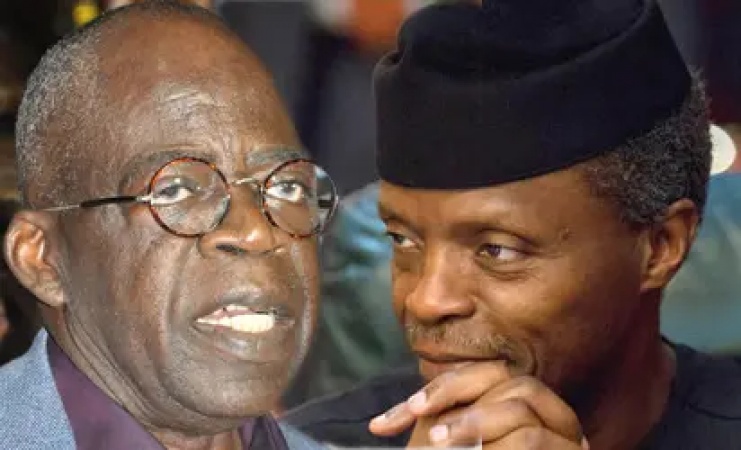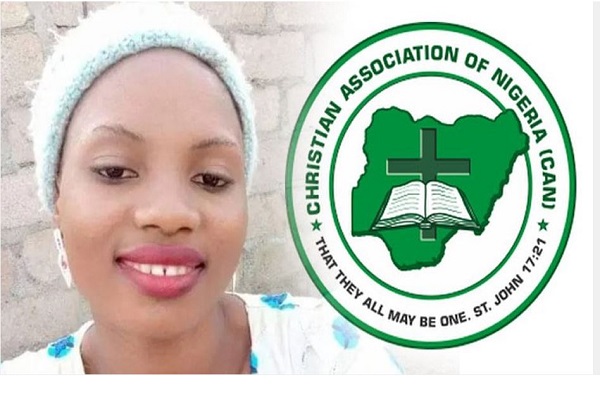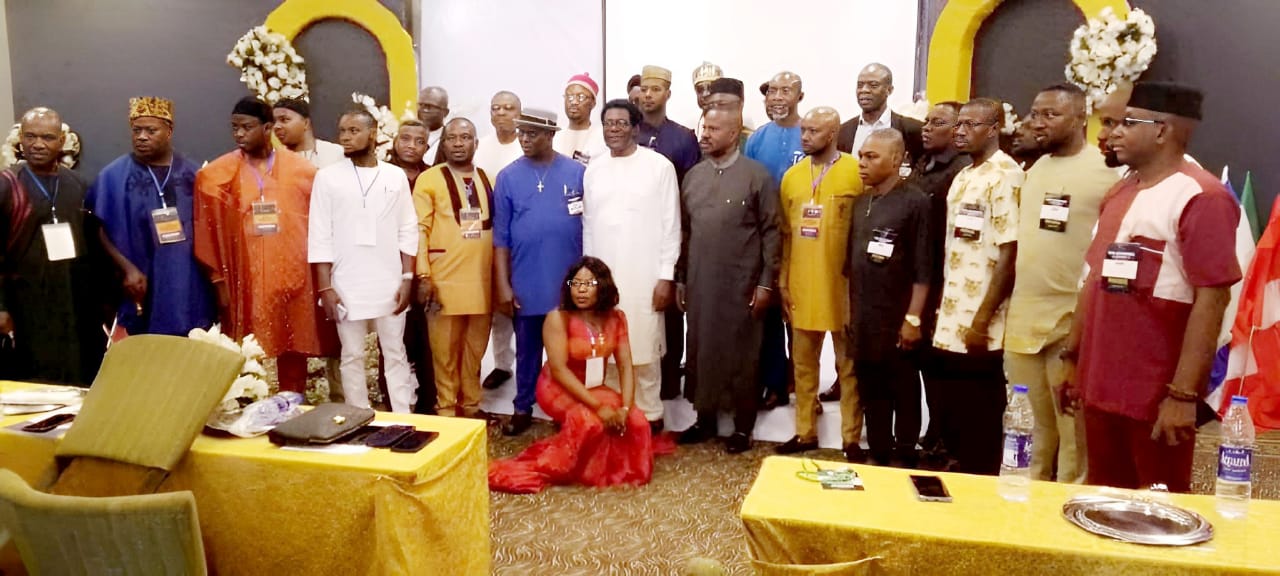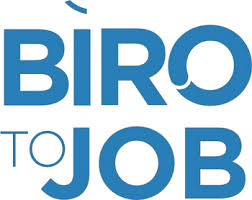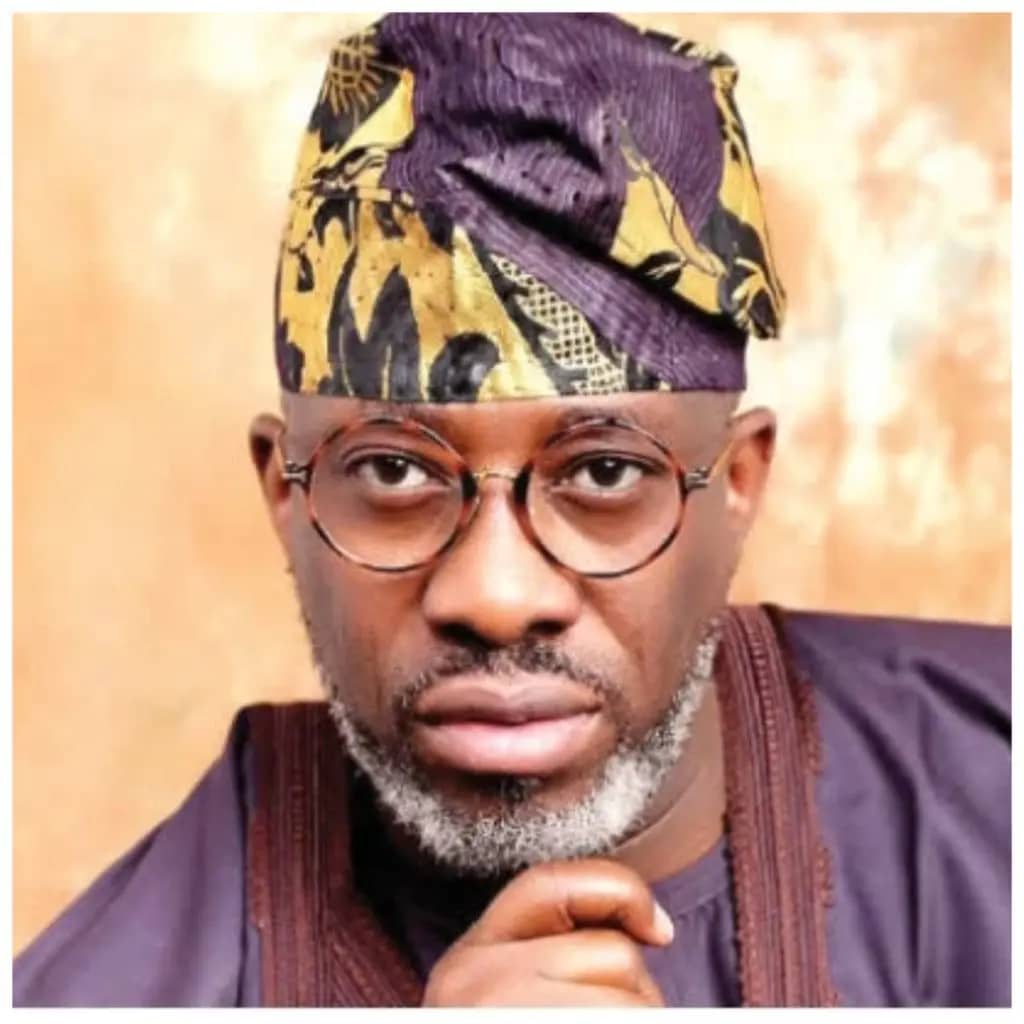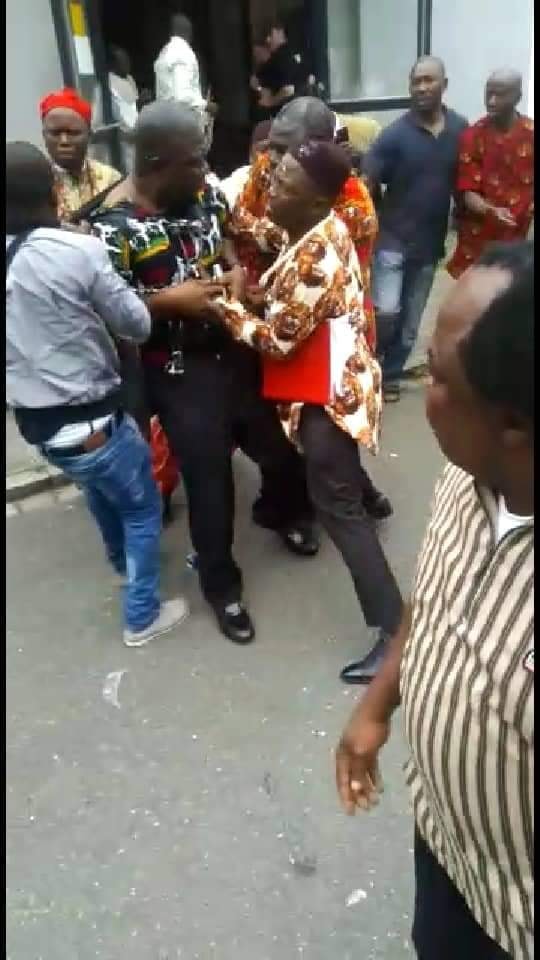2023: Who Wins APC’s Presidential Ticket?
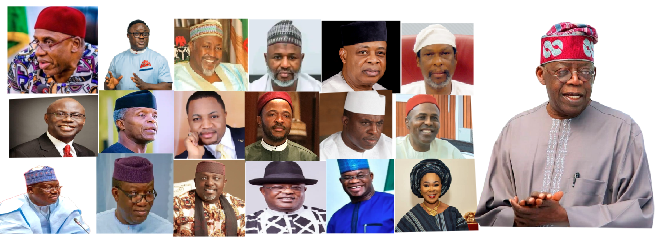
By Dare Odufowokan, Jide Oritunsin, Gbade Ogunwale, Osagie Otabor, Onimisi Alao, Damian Duruiheoma, Linus Oota, Abdulgafar Alabelewe, Okungbowa Aiwerie, David Adenuga, Sola Shittu – The Nation
The race to pick the presidential flag bearer of the ruling All Progressives Congress (APC) comes to a head one week from today. The party will screen 25 presidential aspirants on May 23, 2022, amidst talks that some may not show up for the exercise. After igniting much controversy, former President Goodluck Jonathan, Central Bank Governor, Godwin Emefiele and African Development Bank (AfDB) President, Dr. Akinwunmi Adesina, all opted out of the race.
Nobody ever thought the number of APC chieftains seeking to succeed President Muhammadu Buhari in 2023 would be this high. Not even the high cost of N100 million for the purchasing the expression of interest and nomination forms has been a deterrent.
At the close of sales of forms on Tuesday, 10th of May, 2022, 28 aspirants picked up forms, but only 25 of such forms were duly filled and returned by the aspirants.
If they are cleared by the screening committee and they do not opt out of the race before the date, National Leader of the party, Asiwaju Bola Ahmed Tinubu, Vice President Yemi Osinbajo, Senate President Ahmad Lawan, ex-ministers Rotimi Amaechi, Godswill Akpabio and Ogbonnaya Onu, former governors Rochas Okorocha and Ibikunle Amosun, Pastor Tunde Bakare and Cross River State Governor, Ben Ayade, will slug it out at the two-day national convention of the party beginning May 29. Others in the contest are Ebonyi State Governor, Dave Umahi, Ekiti State Governor, Kayode Fayemi; former Minister of State for Education, Emeka Nwajiuba, former Senate President, Ken Nnamani, Kogi State
Governor, Yahaya Bello, Jigawa State Governor, Mohammed Badaru, former Zamfara State Governor, Ahmed Yerima, Senator Ajayi Borroffice, Uju Ohnenye, Nicholas Nwagbo, Former House of Representatives Speaker, Dimeji Bankole, former Minister of Information, Ikeobasi Mokelu and businessman Tein Jack-Rich.
Out of this crowded field, there would be one man left standing. In this piece, we examine how the aspirants stand; their strengths and weaknesses, as well as their 2023 general elections prospects, were they to emerge as their party’s candidate.
YEMI OSINBAJO
The incumbent Vice-President Osinbajo, declared his intention to succeed Buhari on April 11, 2022. He started his political career under the tutelage of Tinubu, serving as Attorney General and Commissioner for Justice for eight unbroken years. His emergence as running mate in
2015 was down to the fact that powerful voices rose up within the party to oppose what would have been a Muslim-Muslim Buhari-Tinubu ticket. He was subsequently nominated by Tinubu as running mate to Buhari.
STRENGTHS
On the hustings he has been highlighting his experience serving as number two as his key strength. As number two, he also served as Acting President when his principal was in London on medical leave.
Being in government he has ample opportunities to make contacts and improve on networks built up over time.
In his role he was a front man for some of the administration’s key welfare and development initiatives. Although, he was later stripped of most of his powers as these programmes would be transferred to what eventually became the Ministry of Humanitarian Affairs at the start of the second term in 2019.
The VP who is a professor of Law is acknowledged as an articulate speaker. He is also a senior pastor in the Redeemed Christian Church of God (RCCG) – one of Nigeria’s largest Pentecostal congregations – which recently launched an initiative to make its members more politically active , move interpreted by many as the church’s effort at drawing up for their own.
He has embarked on nationwide consultations to sell his aspiration to delegates and critical stakeholders and is believed to have the backing of some governors and professionals under the platform of The Progressive Project (TPP).
The Osinbajo project enjoys the backing of a former aide to President Buhari on Niger Delta Affairs, Senator Ita Ennang. He also has a vociferous promoter in Senator Babafemi Ojudu, Special Adviser to the President on Political Affairs.
WEAKNESSES
Osinbajo lacks the political structure for the actualisation of his aspiration. The lukewarm and non-committal attitude of his principal to who succeeds him may also throw a spanner in the wheel of his presidential ambition.
Except for his home state – Ogun State, the Vice President may not enjoy the support of the Southwest geopolitical zone where his political godfather Tinubu holds sway. He will have his erstwhile boss to contend with in his native Ogun given the presence of many protégées of the former Lagos governor on the state’s political scene. He may not also find it easy with former governor Ibikunle Amosun, also vying for the ticket.
His chances in Ondo State are uncertain despite his friendship with Governor Rotimi Akeredolu. He may also not be able to take delegates away from Ekiti Governor Fayemi who is in the race and Tinubu who enjoys a cult following in the state.
Pundits say Osinbajo will garner some votes in Nasarawa State where Governor Abdullahi Sule is said to have some sympathy for him. But sources in the state say there are other factors aside the governor, that will decide how the delegates will vote. “We may have a situation where each delegate will vote according to the dictates of his or her leader,” a source said.
It is also feared that recent political development in the state and the country has given the governor a bitter lesson about taking early positions after he led the stakeholders of the party in the state to endorse Tanko Al-Makura for APC national chairman, only to see him lose out to Senator Abdullahi Adamu.
It was gathered that Sule is now more careful in handling political matters, moreso when the issue concerns who the state under his leadership will support at the forthcoming presidential primaries of the party.
Our correspondent gathered that the three political leaders in the state, Sule, APC national chairman Adamu and Al-Makura have all agreed to lead Nasarawa State delegates as a united family into supporting one single presidential candidate. Apart from this handful of states, it is uncertain where Osinbajo would get the delegates haul to earn him the ticket.
Analysts say the Ikenne-born politician’s best hope of emerging flagbearer lies in winning Buhari’s ndorsement, but that may just turn out to be a pipe dream, onsidering his strained relationship with some northern elements over the removal of the erstwhile Director-General of the Department of State Security (DSS), Lawal Daura, while Buhari was away on leave vacation.
Political watchers say the Vice President is yet to be forgiven by this close group around Buhari who may be bent on taking their pound of flesh.
GENERAL ELECTION PROSPECTS
Were he to emerge flagbearer, the VP faces an uphill task of rallying the Southwest zone to back his aspiration – especially the base of Tinubu whose supporters would need to be pacified. With him as candidate, the PDP would fancy their chances of dislodging APC from their traditional stronghold.
Losing the Southwest would leave the ruling party in grave electoral peril as it unlikely to seize the Southeast or South-South zones any time soon from the PDP. He is likely to flounder in the North, and do poorly in the Southeast and South-South which the traditional bases of the PDP.
AHMAD LAWAN
The entrance of Senate President, Ahmad Lawan, into the race has mystified many as it defies all assumptions that APC would respect power rotation agreement between North and South reached at its formation.
His aspiration appears to be pitching the party’s overnors against members of the National Assembly. His promoters argue that presenting another Notherner –despite the fact that Buhari would have served eight years by next year – is the best way to keep PDP out of power.
There are also suspicions that his may not be a serious challenge given that he also picked up the Senate nomination form while supposedly launching a presidential bid, A three-time member of the House of Representatives, Lawan’s emergence as President of the 9th Senate has enhanced his political clout and reach. But it has also led to rumblings in a section of Yobe State who grumble that he’s done overtime having been in the National Assembly since 1999.
STRENGTHS
He is believed to have the backing of some members of the National Assembly. He equally has the support of his governor, Mai Mala Buni of Yobe State and his Imo State counterpart, Hope Uzodinma. Both governors picked the Expression of Interest form for him, accompanied by some Senators who are not likey to attend the convention as delegates. Some of the forces were said to have pushed the aborted bids of former President Goodluck Jonathan and Central Bank Governor Emefiele are thought to be pushing the Lawan project.
WEAKNESSES
With no visible campaign structure outside his state, the Senate President is regarded as something of a paperweight. In 2015, he was supported by Tinubu, once President Buhari had indicated he preferred him to lead the legislative arm. But he was easily out-manouvered by former Kwara State governor, Bukola Saraki. It would take the concerted efforts of the former Lagos governor and other key APC leaders to push him over the line in 2019.
He doesn’t have the name recognition of some of the other aspirants across the country. His best hope of becoming flagbearer, again, revolves round the hope that Buhari would endorse him. But the prozoning agitation is still his major albatross as this could make delegates from the South defy all entreaties and vote against his candidacy.
The current Electoral Act is also seen as a huge impediment to his ambition. One of Lawan’s supposed strengths is the expectation that he will reap bountifully from the votes of fellow National Assembly members who were statutory delegates to the convention. But unless Buhari gives his assent to the Electoral Act 2022 Amendment Bill before the commencement of the presidential primary election, only 2,340 adhoc delegates will participate in the exercise. The implication of this for Lawan’s ambition is huge as his base would have disappeared in a flash.
Some days ago, the National Assembly amended Section 84 of the Electoral Act. The legislators deleted subsection (8) and inserting a new sub-section (8) that reads: “A political party that adopts the system of indirect primaries for the choice of its candidates shall clearly outline in its constitution and rules the procedure for the democratic election of delegates to vote at the convention, congress or meeting, in addition to statutory delegates already prescribed in the Constitution of the party.”
The provision in the Electoral Act before the most recent amendment by the National Assembly, which is awaiting the President’s assent read: “A political party that adopts the system of indirect primaries for the choice of its candidate shall clearly outline in its constitution and rules the procedure for the democratic election of delegates to vote at the convention, congress or meeting. The hope of the super delegates to participate in the primary election now depends on Buhari’s disposition to the bill before him.
Also likely to work against him is the perception that the National Assembly under him hasn’t been outstanding. Many have derided it as a rubberstamp only too willing to do the bidding of the Executive.
Analysts say except he is foisted upon the party by Buhari, Lawan is unlikely to emerge as the APC candidate.
GENERAL ELECTION PROSPECT
With sentiments in the South decidedly against another Northerner taking over from Buhari who would have spent eight years in office by next year, a Lawan candidacy would go down like a lead balloon. He would be faced with impossible task of explaining why the APC reneged on power rotation – leading to crushing electoral defeat not only in The Southwest, but also in the Southeast where the push for Igbo presidency has been quite aggressive this time around. His prospects are no better in the South-south zone where he would be confronted by similar sentiments.
BOLA AHMED TINUBU
The former Lagos State governor parades intimidating political credentials. His network cut across several political tendencies, and he is adjudged to be the frontrunner in the race for the presidential ticket.
He was first in the pack to publicly declare his intention to be president. He is one man with a strong passion and conviction to change the political, economic and socio-cultural narratives of the country.
An acclaimed bridge-builder, Asiwaju’s political network explains the calibre and spread of referees that endorsed his expression of interest and nomination forms. He remains the aspirant to beat in terms of reach.
To date, Asiwaju has been and is still visiting delegates across the country. He has reached out not only to members of the political class, including President Buhari, the caucuses of the two chambers of the National Assembly, state governors, delegates, and party chieftains, but his nationwide tour has also secured him the blessings of religious leaders and traditional rulers.
His antecedents in Lagos State where he was governor for eight years, the institutional structures he built for the emergence of a new city state, his strong analytical mind and sense of judgement and ability to discover, nurture and promote potential are some of his virtues that even his political foes cannot deny. His rich private sector background as a high flier in Exxon Mobil, a multinational oil giant, and Delloite and Touche, an international accounting firm, prepared him as an all-round manager which explained his success in his turn-around management of Lagos state.
While his adversaries have tried to make an issue of his health, Tinubu’s busy itinerary and his ability to meet up with his daily activities have been the appropriate riposte. He has over time proved that he is physically, mentally and spiritually prepared for the task ahead of him.
STRENGTHS
With over 5,000 different support groups rooting for his ambition, his links across the Niger and endorsement from the creeks of Niger Delta, Tinubu remains the frontrunner in the race for the APC presidential ticket. Majority of delegates in Ondo state are expected to vote for him. Several support groups in the state working for the aspiration of Tinubu are National Committee for Tinubu Campaign Groups (NCTSG), Southwest Agenda (SWAGA) Tinubu Hope for Nigeria Vanguard, Yoruba Ronu, Ondo State Network for Tinubu (OSNT), Tinubu Support Group (TSG) Asiwaju Change Movement, amongst others. Party sources said though the delegates in Ondo will be divided among the leading aspirants, Tinubu will garner the majority.
According to another source: “Majority of us are for Asiwaju Tinubu but you know Osinbanjo is a friend of our governor while some party executives are supporting Fayemi. Few days to the primary will determine the full direction of where Ondo delegates will go.”
Tinubu will pocket all the votes of delegates in Lagos State. This needs little or no explanation. He has been the undisputable godfather of the state’s politics since 2003. He will garner more votes than anybody else in Oyo State on account of his age-long politics of inclusion. His allies and loyalists are on hand to ensure he wins the state, although it is expected that Osinbajo would also make gains here.
The delegates in Osun State are mainly his for the asking with Governor Gboyega Oyetola, political office holders and party leaders ready to back him to the hilt. Tinubu will share the votes of delegates in Ogun with Osinbajo and Amosun.
In Ekiti, delegates would be shared between state governor Fayemi, Tinubu and Osinbajo. However, the governor is expected to have the bulk of the votes in the state.
Tinubu enjoys cut-like followership in Ekiti being a leading figure that fought for the return of progressives government after the famous 2003 political hurricane that consumed the re-election bid of Otunba Niyi Adebayo and three other governors in the Southwest except him who stood firmly, escaped the political conquest and retained Lagos.
The former governor enjoys the backing of APC prominent stakeholders. They include the National Coordinator of South West Agenda for Tinubu 2023 (SWAGA), Senators Dayo Adeyeye, Senator Opeyemi Bamidele, Anthony Adeniyi, ex- Speaker, Ekiti State House of Assembly, Hon. Wale Omirin.
Others are ex-House of Representatives members, Hon. Oyetunde Ojo, Bimbo Daramola, Prince Bamigboye Adegoroye, amongst others. These grassroots politicians are delegates at the coming national convention and are die hard and trusted loyalists of the former Lagos governor.
As for the APC in Adamawa, as things stand today in the state, the pendulum of delegates’ support will most likely swing in Tinubu’s favour where he has key backers in the likes of former Secretary to the Government of the Federation, Babachir Lawal and former EFCC chairman, Nuhu Ribadu.
Bauchi State APC is rooting for him and analysts say the former Lagos governor looks good to get good votes from delegates in Gombe and Taraba States. Borno is practically for him with former governor, Senator Kashim Shettima leading his squad. He may not do too well in Yobe State, being the home state of Lawan and Buni. Amidst permutations that the delegates in the Southeast will be shared between Governor Dave Umahi of Ebonyi State and Senate President Lawan, pundits and party sources say Tinubu will still garner sizeable votes in the region owing to his many years of relationship with some of the leading chieftains of the party in the region. Tinubu is very popular in Nasarawa State where he has some foot soldiers helping with his campaign. He is expected to slug it out with Amaechi and Osinbajo for the votes of the delegates. Until very recently, it was widely believed that governor of the state, Abdullahi Sule, was in support of the former Lagos governor.
Former governor of the state, Senator Almakura, is a key backer. Tinubu also enjoys the support of a number of National Assembly members from the state. His support base is equally huge in Niger State where the governor, Abubakar Sani-Bello is an ardent supporter.
The presence and leadership of Minister of Special Duties, Senator George Akume, in Benue APC assures him of the support of the delegates from the state. His recent warm reception in Kwara is a pointer to another state where he is quite strong.
Katsina State looks very good for him with Governor Aminu Masari seen as one of his staunch supporters. He just concluded a triumphant visit to Kano where he received the enthusiastic endorsement of Governor Abdullahi Ganduje and state delegates.
He equally has reasons to be positive about Kaduna State. Sokoto is another safe zone for Tinubu. His relationship with Senator Aliyu Wammako, is long and enduring and expected to translate into votes for him.
In the South-South zone, he is expected to do well in Edo State where former governor Adams Oshiomhole is nominally a presidential aspirant but is known to be more interested in the senatorial contest.
Most analysts agree he’s in pole position to clinch the presidential ticket in an open, free and fair contest, barring any unforeseen development before or during the primary election.
WEAKNESSES
Among issues that have been raised against Tinubu is that he is old at 70. There is also the suggestion that certain vested interests are not keen on him winning the party’s ticket. He has also lost some of his old associates who for their own reasons have chosen to move on to new friends. He countered the claim that he is too old at 70 by saying that the job of a President calls for mental alertness and that he is not only mentally sound he is also as fit as a fiddle for the job.
GENERAL ELECTION PROSPECTS
These are considered generally bright for the APC National Leader. His presence on the ticket would galvanise support for the ruling party and energise voter turnout in the Southwest base. He may not help APC takeover the Southeast or South-South, but his ability to keep his stronghold means the party can reprise its electoral victories of 2015 and 2019 if it can manage a majority in the North while keeping hold of the Southwest, the bastion of support for the party.
In the North, he is as popular as he is in the Southwest that is eagerly waiting for him to emerge. Voters in the North will reward him for standing firmly with Buhari , leading to the defeat of an incumbent President, the first if its kind in Nigeria. Analysts see a reenactment of the MKO Abiola phenomenon when a popular politician from the Southwest defeated a Northerner in the election of 1993.
JOHN KAYODE FAYEMI
The Ekiti State Governor and Chairman of the Nigeria Governors’ Forum (NGF), John Kayode Fayemi, popularly called JKF, is another contender for the coveted ticket. Aside from Ekiti, the political strength of Fayemi in the Southwest is limited. However, opponents should not underrate him because he has been central to appenings in the party in the last two years.
STRENGTHS
Fayemi is expected to harvest the bulk of the votes in his state. He controls the structure from the ward to state level and the executives have undiluted loyalty to him. Ordinarily, this would be an electoral fortress for the governor but the visible imprints of Tinubu in Ekiti APC would be his greatest headache.
As NGF chairman, two-term governor and former minister, Fayemi has built up an impressive network of political contacts across the country.
However, it remains to be seen whether leading the governors’ body actually translates into tangible capital that can pay off in the primaries. He positions himself as an intellectual.
WEAKNESSES
He doesn’t have visible political structures outside his state. Despite his close ties to El-Rufai, no governor is known to be backing his aspiration.
His best chance of getting the ticket may be the endorsement of Buhari which may never come.
Recently, his role in the leadership of the ruling party came back to bite him with Oshiomhole alleging that Fayemi tried to get him to commit electoral fraud. The Ekiti governor replied by suggesting that none of that happened and his former colleague was suffering from Post Traumatic Stress Disorder (PTSD).
However, his role and that of other APC governors who were not pleased that Godwin Obaseki didn’t get a second term remains the object of much controversy. The ruling party eventually lost the Edo governorship to PDP because of lukewarm support and even outright backing for the other side as has been claimed by Ganduje who led his party’s effort to retain the state.
GENERAL ELECTION PROSPECTS
Pitched against a probable Atiku PDP candidacy, he would also be a lightweight. He would also have to work hard to rally the Southwest to produce the sort of fervor Tinubu does among his supporters. Again, he, like most other APC aspirants, would struggle to make inroads in the Southeast and South-South zones.
ROTIMI AMAECHI
The former Minister of Transportation, Rotimi Chibike Amaechi, is a presidential aspirant to watch. He is leaving no stone unturned to succeed Buhari. But pundits say he will have to do much more to win the ticket. He has traversed the length and breadth of the country seeking the support of party chieftains and delegates for his dream to come through.
STRENGTHS
Amaechi prides himself as the most experienced in the race. He has been Speaker of the Rivers State House of Assembly for eight years, Chairman of Forum of Speakers for eight years, two-term governor, Chairman of NGF for eight years, twice Director-General of the Buhari Campaign Organisation and minister for almost eight years. He tells anybody who cares to listen that he’s the most qualified and equipped aspirant to lead a post-Buhari era.
Many hail his time as government as a period of great infrastructural development in the state, with the building of major roads and high standard public schools.
Amaechi will naturally win the votes from his native Rivers and do well in neighbouring Bayelsa State following the withdrawal of Timipre Sylva from the contest. He is also known to be strong in Kaduna State on account of his friendship with Governor El Rufai and Buhari.
But his strongest base up north appears to be Plateau State where his ties with Governor Solomon Lalong go back to their days as Speakers. He is also known to have supported the governor’s electoral efforts in past.
Lalong pointedly referred to this during the former minister’s recent visit to Jos, when he said it was time for him to reap from his investment.
Aside his much-vaunted experience, he’s a political warrior who never shirks a fight. He’s is also said to with an adequate war-chest required to prosecute a presidential bid.
WEAKNESSES
However, his standing in the Southeast is not impressive. He was even asked to stop referring to himself as an Igbo man by leaders of the zone recently. And in the southwest, he is not known to enjoy any political goodwill in any of the states, nor does he have any special relationship with prominent leaders of the party in the zone. He will lose woefully in the zone.
His major albatross lies in his home state where despite being a twoterm governor, incumbent Nyesom Wike has made it his life’s project to wipe out his erstwhile boss’ political footprints. Part of this war of attrition has seen the ex-minister entangled in the report of a panel of inquiry set up to probe his administration’s sale of the state-owned turbines.
Amaechi is currently in court to overturn the report of the panel which he claims was politically-motivated. This week would be crucial as the Supreme Court would rule whether the Rivers State government was in the right in setting up the panel. If the court upholds the indictment, it would be a blow to Amaechi’s bid.
Apart from not being able pull through his succession plan in 2015, APC has been virtually neutralized as a force in the state. Not just that, his former ally and Secretary for Government, Senator Magnus Abe, has become an implacable foe, locked in mortal combat with the former minister. The upshot is a party divided down the middle in the state.
Amaechi has tried to parlay close ties to the president as an advantage in the race. He even was turbaned Dan Ammanar in Buhari’s hometown of Daura. So, even if the delegates counts doesn’t make him the frontrunner, he would be hoping that a presidential anointing tilts the race in his favour.
GENERAL ELECTION PROSPECTS
It’s hard to see how an Amaechi candidacy helps APC to retain power.
For the party to be able to get its own elected as Buhari’s successor, it must retain at – no matter how marginally. The former minister isn’t going to enthuse Southwest voters neither is he going to snatch his South-South base which is a PDP stronghold. We can also say the same thing for the Southeast which would be frustrated that its strong push for the presidency hasn’t been accepted by the two leading parties. He will be easily demolished by the PDP
IBIKUNLE AMOSUN
The former governor of Ogun State is one of the three presidential aspirants from the state. Believed to be one of the closest Southwest politicians to Buhari, the Senator for Ogun Central is not a pushover.
Though currently at loggerheads with Governor Dapo Abiodun, political watchers in the “Gateway State” say he may have to look elsewhere as he may not get the support of delegates from his state. He is also not known to have built any political structure outside Ogun. He is no threat to the leading contenders.
However, if statutory delegates eventually make it to the convention, he may be in position to negotiate with stronger contenders.
OGBONNAYA ONU
The former Minister of Science, Technology and Innovation, Ogbonnaya Onu, a founding member of the APC is one of the aspirants from the Southeast. Highly respected by Buhari, the 70-year-old presidential hopeful may be banking on President’s endorsement as consensus candidate.
Political observers noted that the first civilian governor of Abia State lacks the required political structure that can deliver him his desired job.
He lacks the needed national clout and name recognition the contest for president requires. He may be in the contest to maintain his relevance.
DIMEJI BANKOLE
The youngest politician ever to have occupied the nation’s number four seat, the likeable and ever-smiling, Dimeji Bankole, former Speaker of the sixth House of Representatives, has been in limbo after he failed to return to the National Assembly.
Observers argue that Bankole, whose bid for the Ogun State governorship seat fell flat at the last polls, cannot be taken seriously for the presidency of the country. He is considered to be one of the pretenders who are in the race for another motive.
CHUKWUEMEKA NWAJUIBA
The former Minister of State for Education, Chukwuemeka Nwajuiba, is another aspirant to watch. He was the first to obtain the nomination forms and the first to return them. A well-connected member of the inner caucus of President Buhari’s defunct Congress for Positive Change (CPC), sources within the Presidency said that Nwajuiba is one of the few Southeastern leaders that have the ears of the president. Some even refer to him as “Buhari’s son.”
The former member of the House of Representatives is leveraging on the influence of the Forum of Former Members of the House to reach out not only to the delegates but to other crucial organs of the party. But the rug might have been pulled off his feet with the confusion surrounding participation of statutory delegates.
Though one cannot attest to his financial viability for the race, his ability to raise the N100 million must have sent a signal to his political detractors that he has the financial war chest to prosecute the election.
Described by some party faithful as the dark horse in the presidential race, the politician’s albatross is the lingering strike by the Academic Staff Union of Nigerian Universities (ASUU). Many have derided is decision to run saying the never-ending strike wasn’t the best advertisement for his problem-solving abilities.
YAHAYA BELLO
Kogi State Governor, Yahaya Bello, joined the race far ahead of many aspirants, but his critics never take him seriously. Bello used his assignment under the Mai Mala Buni-led Caretaker Committee as Chairman of the Mobilisation and Sensitisation Committee of the just concluded membership registration and revalidation exercise to sell his aspiration to party faithful.
The tenacity with which he has been pursuing his ambition has won him the hearts of many party members, mostly youth, women and physically-challenged persons. However, he lacks political structures and alliances outside his home state and that will count against him in the race. He is not seen as a serious contender and power rotation calculation would work against him.
DAVE UMAHI
Ebonyi State Governor, Dave Umahi, was the first aspirant from the Southeast to declare for the presidency. He joined the race immediately after Tinubu’s declaration. Though he has a good record of performance as a state governor, he’s a political paperweight at national level.
Coming from a zone with the lowest number of elected delegates for the convention, pundits rate him low and suggest that his bid is for relevance.
ROCHAS OKOROCHA
The two-term former governor of Imo State, Rochas Okorocha, remains the most colourful aspirant from the Southeast. In the whole pack he is something of a serial contestant. This attempt is his fourth. He is a great philanthropist whose kind gestures spread across the country and even nations of Africa.
Ordinarily a formidable politician, but the current face-off between him and governor of his home state, Hope Uzodinma, makes his aspiration a non-starter. He may be going to the convention without a single delegate from his home state because the governor has openly cast his lot with Lawan.
UJU KENNEDY
Her courage to play where angels fear to tread, singles out Uju Kennedy, the only female aspirant in the race for the APC presidential ticket. She may not be going any further than the media mention she has enjoyed since joining the race.
A political neophyte, what Uju has in courage she lacks in political credentials. Not known to have occupied any political office, the lawyer turned politician may find it difficult to secure the support of both the statutory and elected delegates at the shadow election of May 29 to become Nigeria’s first female presidential aspirant.
TUNDE BAKARE
The General Overseer of the Citadel Global Community Church, Lagos, Pastor Tunde Bakare, a fierce preacher, came into the political limelight following his series of critical and down to earth sermons and the courage to speak truth to power.
In 2011, his nomination as running mate to Buhari as then presidential candidate of the defunct Congress for Positive Change (CPC) became his major inroad to the political arena. Though qualified and competent to effectively carry out the responsibilities of the office of the president, Bakare lacks the structure and network to deliver him the ticket.
The lawyer turned clergyman and now politician is seen more in the media than reaching out to delegates who are the determinant factors of who gets what at the primary. Though he claims he had a divine mandate of becoming the 16th President of the country, earthly delegates in Abuja are set to give him a reality check.
NICHOLAS FELIX
The presence of the youngest presidential aspirant has given a boost to the “Not Too Young To Run Act”. Though relatively unknown, Felix, a US-based pastor may have only succeeded in putting his name on the country’s political map. But for him to emerge APC candidate he would need to pull a miracle that would rate the eighth wonder in the world.
KEN NNAMANI
Former Senate President, Ken Nnamani’s, attempt at occupying the country’s highest office is seen by many as another race to nowhere. He lost his bid to become Deputy National Chairman of the party at the March 26 APC national convention of the party; many expect his presidential aspiration to suffer a similar defeat come May 28.
Aside from the fanfare that greeted the submission of his nomination forms in Abuja, Nnamani has disappeared from the radar. Observers say the former number three man is basing his aspiration on possible zoning of the presidency to the Southeast by the party.
BEN AYADE
The emergence of Cross River State Governor, Ben Ayade, in the race for the APC ticket would not have been taken seriously but for the whopping N100 million payment for the nomination form. A man not known for frivolities, many are yet to understand his game plan.
Some of his critics said the need to remain politically relevant may be the driving force. Having served as a senator and two-term governor, Ayade may be in the presidential race for negotiation as a possible Vice President were the zoning arrangement to favour a northern presidency, just as it has been mooted by the opposition Peoples Democratic Party (PDP).
MOHAMMED BADARU
Jigawa State Governor, Mohammed Badaru, is another presidential aspirant whose entry into the race is viewed with much curiousity. A member of the elite club of APC governors, he is thought to be in the race for a strategic reason – with an eye to being considered for the Vice Presidency.
Though he has not been seen reaching out to delegates, observers in the party said he is relying on his strong network with APC governors who are in firm control of their delegates to deliver to him the party’s ticket.
But his bid cannot be taken seriously, not just because he lacks national profile, but because of power rotation issues.
SANI YERIMA
Former Zamfara State Governor, Ahmed Sani Yerima, has been working quietly on his presidential aspiration for over two years now. He formed a support group for the actualisation of his bid.
Though he is from the geopolitical zone as Buhari, the strong man of Zamfara politics claims he has built bridges across the nooks and crannies of the country to see him through to his dreamland.
Yerima has vowed not to settle for anything less than the presidency, but maintained that the race is not a “do or die” issue. This is one aspiration that’s going nowhere fast.
AJAYI BOROFFICE
Senator Ajayi Borrofice, a senator from Ondo State, remains the underdog in the APC presidential race. A serving federal legislator, his entrance into the race is perceived by many as an attempt to gain prominence and relevance. His aspiration is no threat to anyone.
CONCLUSION
As things stand today, the race for the APC ticket is actually narrowing down to the following – Tinubu, Osinbajo, Amaechi and Lawan. While the former Lagos governor looks good to clinch the ticket in an open contest, the other three can only emerge victorious if the party decides to nominate its candidate by consensus, or Buhari decides to intervene in favour of a particular candidate other than Tinubu.
However, analysts are strongly of the opinion that a Tinubu candidacy is the ruling party’s best option, one; on account of the widespread agitation for power shift from the north to the south after eight years of Buhari in office, and two; on account of his nationwide political structures and acceptance which will help the party win re-election in the presidential election proper.
Pundits say with his firm hold on the politics of the Southwest, he is sure of giving APC majority votes in all states of the zone at the general election if he is the candidate of the party as his emergence will generate widespread enthusiasm.
Across the different zones of the country – especially in the North – he has built a pool of goodwill by investing in the lives of all manner of people even when he had no presidential ambition. Today, that process of sowing over several decades is ready to yield an abundant harvest.
But the strongest thing he has going for him is that of all the Southern aspirants he is the one that can be guaranteed to deliver his zone and compete on equal footing with whoever the PDP eventually throws up.
